You've likely heard about the importance of rabies vaccinations for cats, but have you ever wondered why it's so crucial? It's not just about protecting your furry friend; it's also about safeguarding your family, and even the broader community, from this deadly virus. Yet, there's a lot more to this topic than most pet owners realize. From understanding the vaccine's role to recognizing the signs of rabies, administering the vaccine, and knowing the legalities, there's plenty to explore. Curious to find out more? Let's jump in!
Understanding Rabies in Cats
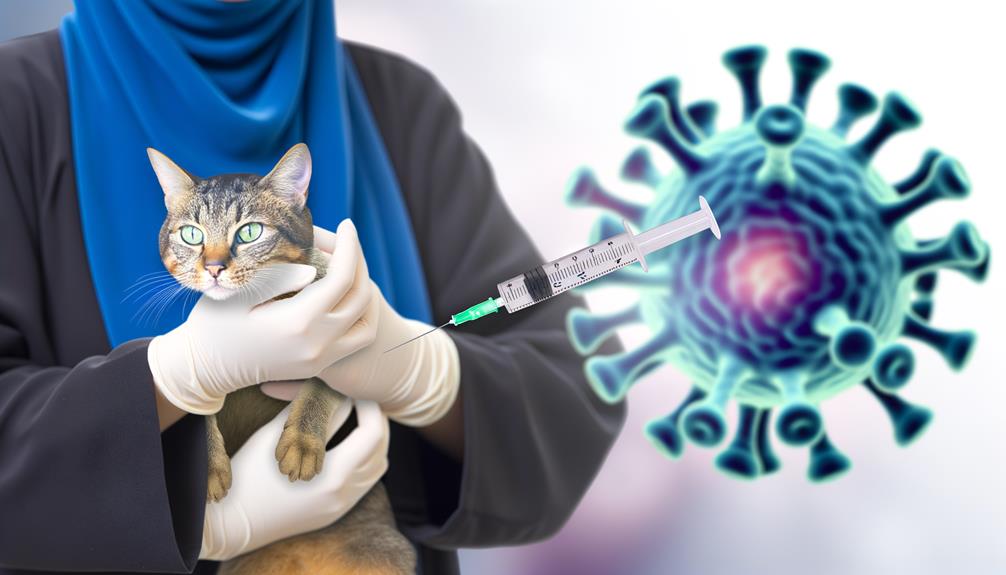
To fully grasp the importance of rabies vaccines, you first need to understand what rabies is and how it affects cats. Rabies is a deadly virus which can affect the nervous system of almost any mammal, including cats. The virus is usually transmitted through the bite of an infected animal. It's not just limited to bites, though; it can also be spread if infected saliva comes into contact with any open wounds or mucous membranes.
Once a cat is infected, rabies can lead to severe neurological problems and, if left untreated, is almost always fatal. Early symptoms might include behavior changes, fever, and excessive drooling. As the disease progresses, you might notice your cat becoming increasingly aggressive or excessively timid.
Rabies prevention strategies are crucial in safeguarding your pet's health. They include avoiding contact with wild animals that might be carriers of the virus, keeping your pet indoors, and, most importantly, getting them vaccinated. Swift action is key to preventing the spread of this deadly virus, and understanding rabies in cats is the first step towards ensuring your pet's safety. Remember, an ounce of prevention is worth a pound of cure.
Importance of Cat Rabies Vaccine

Now that you're clued up on the dangers of rabies in cats, let's talk about why getting your cat the rabies vaccine isn't just important, it's a lifesaver. The vaccine serves as a barrier, boosting your feline's immunity against the deadly disease. It's like equipping your cat with a protective shield, making them less likely to contract rabies if exposed. This bolsters their overall health and reduces the risk of transmission to humans.
Vaccine affordability also makes it a no-brainer. In comparison to the potential costs and emotional distress of treating a cat with rabies, the vaccine's price is a small investment. It's a proactive approach that can save you from future heartache and your wallet from a significant hit.
Signs Your Cat May Have Rabies
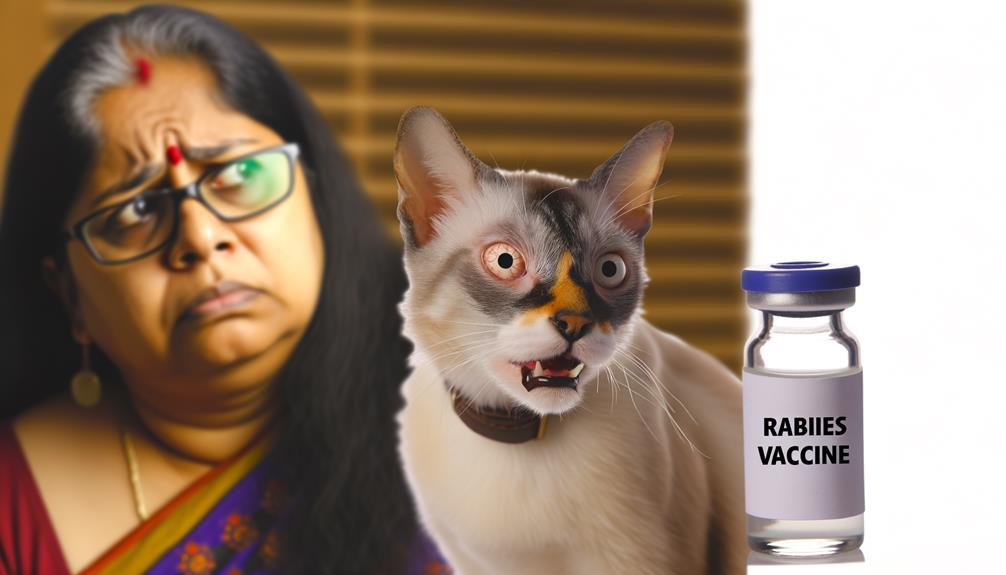
You've vaccinated your cat, but what if you suspect they've contracted rabies?
It's crucial to spot the symptoms early, noticing any changes in your cat's behavior, including unexplained aggression.
We'll guide you through these tell-tale signs, ensuring you're well-equipped to protect your feline friend.
Recognizing Rabies Symptoms
If your feline friend starts showing unusual behavior, it might be a sign they've contracted rabies. One of the rabies transmission methods is through the bite of an infected animal. So, if you know your cat has been in a fight recently, watch out for any changes.
Your cat may seem overly aggressive or unusually quiet. They may also have difficulty swallowing, leading to a lot of drooling. If you suspect your cat has been exposed to rabies, it's essential to start quarantine procedures immediately. This will help prevent the spread to other pets or humans.
Changes in Cat Behavior
Spotting changes in your cat's behavior can be a vital clue to a possible rabies infection. It's important to note that signs may not be obvious at first, so you need to be particularly observant.
Your feline friend might start displaying unusual affection. This change could seem endearing, but it might also be a sign of discomfort or distress. Another indicator is excessive grooming. While cats are known for their cleanliness, an infected cat might groom itself excessively due to increased agitation or itchiness.
Keep an eye out for:
- Peculiar behaviors that are out of character for your cat
- Unusual affection suddenly shown towards you
- Excessive grooming, more than the usual routine
Aggression: A Key Indicator
One of the most telling signs your cat may have rabies is a sudden, drastic shift towards aggressive behavior. Your normally placid feline friend may become irritable, jumpy, or even violent, which can be quite alarming.
Unusual noises might accompany this aggression, such as growling, hissing, or other sounds that you're not accustomed to hearing. Alongside this, you might notice heightened feline fearfulness. Your cat may appear overly anxious, skittish, or scared in familiar environments.
It's essential for you to be aware of these potential indicators of rabies. If you observe any of these signs, it's crucial that you promptly consult your vet. Remember, early detection and vaccination can drastically increase your cat's chances of survival.
Administering the Rabies Vaccine
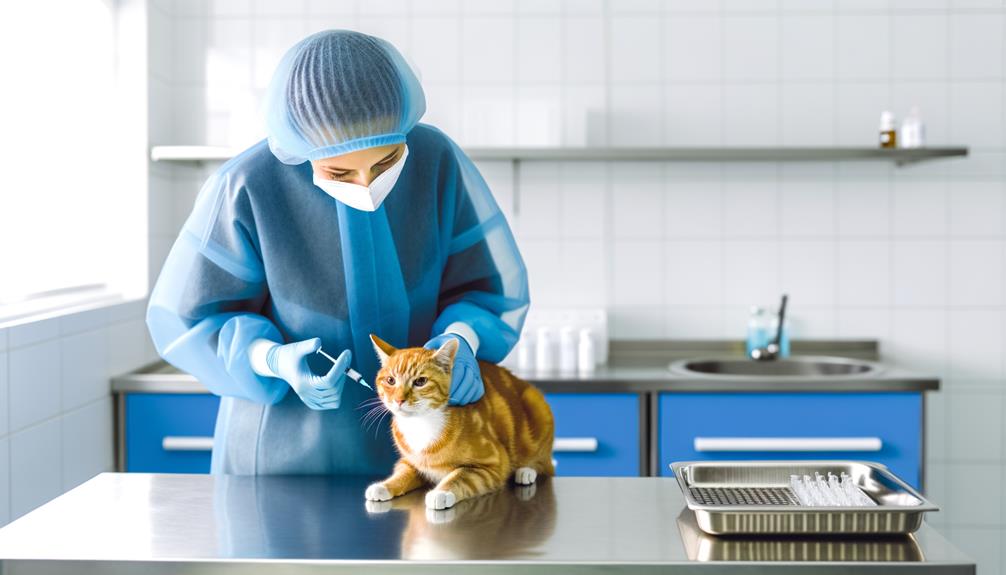
Now, let's discuss how to properly administer the rabies vaccine to your feline friend.
It's crucial to understand not only the importance of this vaccine, but also the correct techniques to administer it and what care must be taken post-vaccination.
Ready to equip yourself with this knowledge?
Understanding Rabies Vaccine Importance
Ensuring your cat receives a rabies vaccine is a crucial step not only for their health but also for the wellbeing of your household. This vaccine is affordable and serves as one of the most effective rabies prevention methods.
Here's why the rabies vaccine is so vital:
- It's a cost-effective way to prevent a deadly disease.
- It provides a shield of protection for your pet and your family.
- It's a legal requirement in many regions, helping to control the spread of rabies.
Proper Vaccine Administration Techniques
To properly administer the rabies vaccine to your cat, it's essential to understand the correct technique and procedure. This usually involves a subcutaneous injection, typically given in the right hind leg.
Now, vaccine cost considerations come into play. It's cost-effective to get your cat vaccinated during regular vet check-ups. You can even save more if you run a multicat household. Vaccinations for multiple cats are often discounted, making it affordable to keep all your furry friends safe.
Always ensure the vaccine is stored correctly and isn't expired. Improper handling can reduce the vaccine's efficacy.
Lastly, remember to keep a record of your cat's vaccination. This helps in tracking when the next shot is due. Don't skip this essential step in maintaining your cat's health.
Post-Vaccination Care Tips
After getting your cat vaccinated, it's crucial you monitor them closely for any signs of reaction or discomfort. Vaccine reactions can occur, though they're typically rare and mild. Here are a few comfort measures you can take:
- Keep a close eye on your cat's behavior and physical condition. Look for any changes in appetite, energy levels, or stool consistency.
- Offer a quiet, comfortable space for your cat to rest in. This could be a cozy bed or a favorite spot in the house.
- Stay calm and provide gentle reassurance. Your cat might be a bit anxious after the vaccine, your calm demeanor can help them relax.
Frequency of Rabies Vaccination
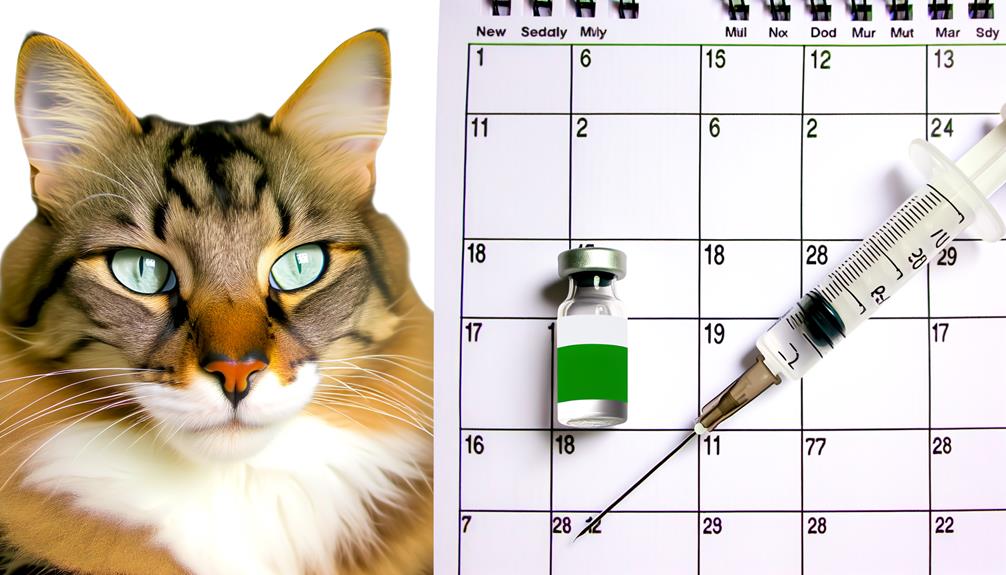
You'll need to get your cat vaccinated against rabies regularly, but the exact frequency depends on several factors. These include vaccine costs and the duration of immunity provided by the vaccine.
Vaccine costs can affect how often you choose to vaccinate your cat. More expensive vaccines might offer longer immunity, reducing the need for frequent shots. Conversely, cheaper vaccines may require more frequent administration. It's a balancing act between cost and convenience, so it's important to discuss this with your vet to find the most effective and economical option for you and your feline friend.
The duration of immunity is another key factor. Some rabies vaccines provide immunity for a year, while others can protect your cat for up to three years. So, the longer the immunity duration, the less frequently you'll need to vaccinate your cat.
Possible Side Effects
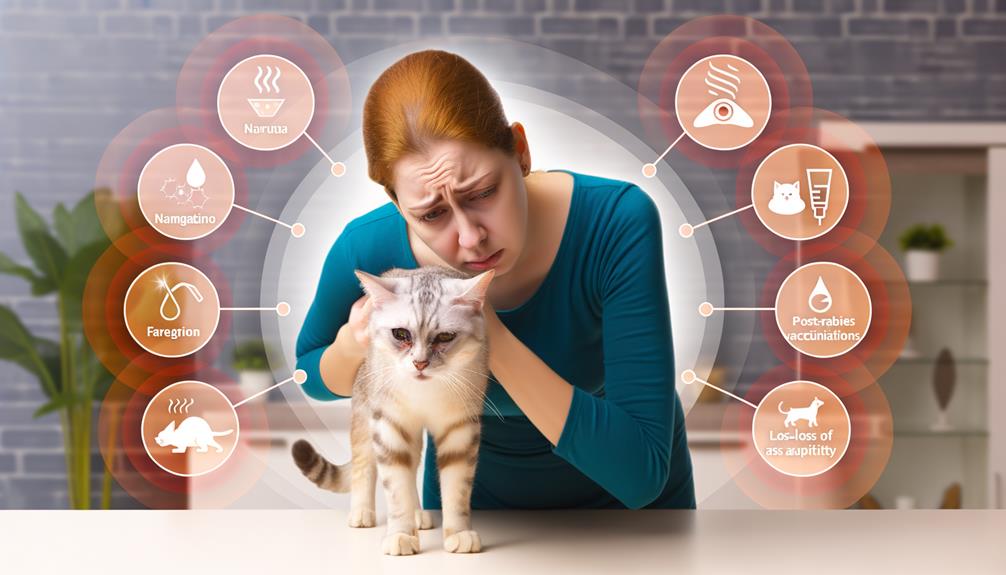
While considering the frequency of your cat's rabies shots, it's also important to be aware of the possible side effects that could arise post-vaccination. Just like humans, cats can also have reactions to vaccines, often due to vaccine allergies or incorrect dosage considerations.
It's crucial to keep a close watch on your pet after the vaccination. Any changes in behavior or physical appearance should be reported to the vet immediately. While most side effects are relatively mild and short-term, some can be severe and require immediate medical attention.
Here are some possible side effects you may observe:
- Mild fever
- Loss of appetite
- Swelling at the injection site
Legal Requirements and Recommendations
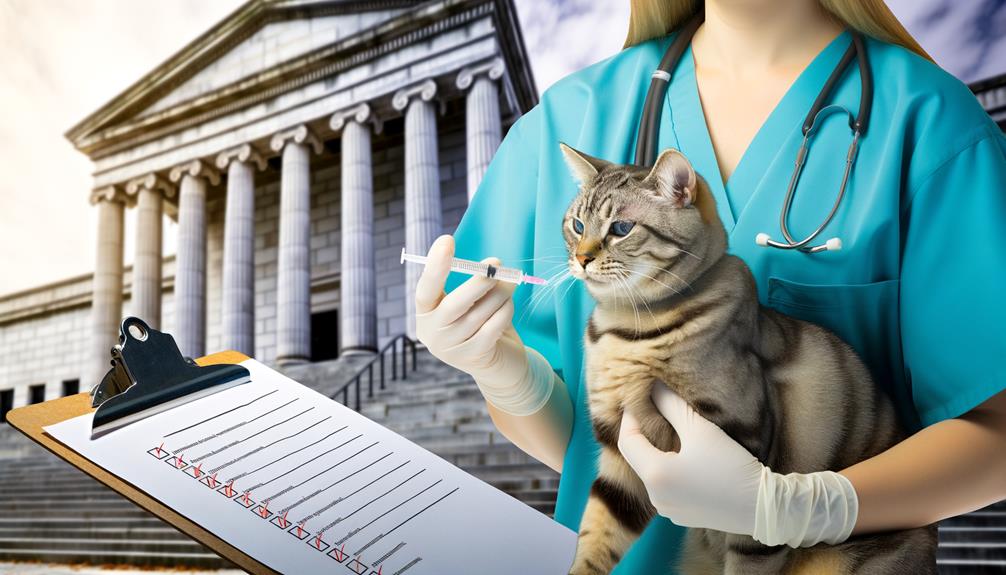
Let's delve into the legal requirements and recommendations surrounding the rabies vaccine for cats. You'll find that vaccine legislation varies from one area to another, but the common thread is mandatory immunization. This means that the law often requires you to ensure your cat receives the rabies vaccine, largely due to the health risks associated with the disease.
In most states across the U.S., it's a legal requirement to have pets vaccinated against rabies. The same goes for many other countries worldwide. The frequency of these mandatory immunizations, however, can differ depending on your location and local laws. Some places require annual shots, while others call for a booster every three years.
The recommendations from vets often align with these legal requirements. They'll likely advise you to stick to the vaccination schedule set by your local legislation. It's not just about satisfying the law—it's about safeguarding your cat's health and the wellbeing of those around you. Rabies is a severe, often fatal disease, and its prevention through vaccination is vital. So, take the legal requirements and recommendations seriously and protect your feline friend against this deadly virus.
Frequently Asked Questions
Can Indoor Cats Contract Rabies and Require Vaccination?
Yes, even indoor cats can contract rabies. Rabies transmission methods aren't limited to outdoor exposure. It's crucial to strengthen your cat's immunity with a rabies vaccine, regardless of their indoor-only lifestyle.
What Is the Cost of the Rabies Vaccine for Cats?
You're asking about the price of a particular vaccine. Vaccine administration costs can vary widely, usually between $15 to $30. It's worth checking if your insurance coverage includes this procedure to reduce out-of-pocket expenses.
Are There Any Natural Alternatives to the Rabies Vaccine for Cats?
You're asking about natural alternatives for protecting your feline friend. While herbal remedies might offer some health benefits, there's no proven natural substitute to prevent vaccine side effects or the deadly rabies virus.
How Effective Is the Rabies Vaccine in Protecting Cats Against the Disease?
You're asking about the efficacy of a certain vaccine in preventing disease. Well, it's highly effective and significantly reduces rabies transmission. However, like all vaccines, it's not 100% and may have minor side effects.
Should Kittens Be Vaccinated for Rabies and at What Age?
Yes, you should vaccinate your kittens for rabies. Generally, it's done at around 12 weeks old. Be aware, vaccine side effects can occur, but they're less risky than rabies transmission. Consult your vet for specifics.
Conclusion
Keeping your cat's rabies vaccine up-to-date isn't just vital for their well-being, but also for your safety. It's a proactive, affordable measure that safeguards against a deadly virus.
Be alert to any signs of rabies and ensure timely administration of the vaccine. It's important to know the frequency of vaccination and possible side effects.
Remember, it's not just a legal requirement but also a part of responsible pet ownership.







